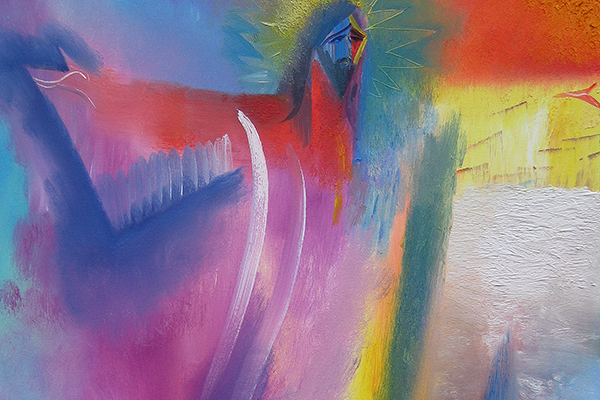We know from the Gospels that there was some tension and conflict between Pharisees and Christ. They could not comprehend and justify within their religious tradition and understanding, the authority with which Christ was boldly teaching in the name of the heavenly father, forgiving sins, healing and challenging many accepted religious traditions and teachings.
The theme of Christ’s encounters with Pharisees inspired many artists throughout centuries. Starting from the period of great Renaissance to our modern times, there has been an increased interest to portray and capture the full scale of the friction and tension of these encounters. Often no efforts were spared to depict Pharisees as evil, spiritually blind and manipulative characters full of hatred and envy. On the other hand, Christ is depicted as preaching with full Devine authority, casting them out, revealing their true color and character. To be honest, I personally don’t like this approach much. But I do admire the older, in my opinion also more authentic interpretation that can be seen in the Orthodox iconography. Even when portraying conflictual situations, the icons radiate peace and mercy. The focus is always on Christ and on illustrating how his love and care was revealed in the story. In icons, there is no judgement, no rebuking or casting anyone out, but rather Christ always and in everything healing, loving and reaching out.
Today’s Gospel reading is about one such encounter between Christ and Pharisees. It probably started as an ordinary quiet afternoon on Sabbath. The streets and markets of the Jewish town, which usually at this time of the day would be crowded, are completely empty. Everyone is either in the synagogue or at home, resting from all work on the holy day of the week and celebrating the Sabbath. Jesus and his disciples are leaving the town and as they approach the outskirts of the town, they find themselves in the embrace of the endless grain fields stretching in every direction around them as far as the eye could see. The gentle whisper of the wind passing through the grain fields sounds almost like music, like a tender tune of peace and tranquility.
The disciples were plucking the grain and making their way through the field with Jesus when they came across a group of Pharisees. Pharisees could not believe what they just witnessed. How could the disciples of Jesus be picking and plucking the grain on Sabbath? How can Jesus and his apostles be teaching others when they themselves don’t know the law and tradition or don’t observe it. The disciples were doing so because they were probably hungry, Jesus did not prevent them from doing so to show and to remind us that human need takes precedence over the observance of religious laws and traditions. His reply to Pharisees was compelling, “If you had known what these words mean, ‘I desire mercy, not sacrifice,’ you would not have condemned the innocent” (Matthew 12:7). Jesus could have approached the situation through the scope of the tradition, acceptable social viewpoint, theology and their understanding and meaning of the Bible, but instead he viewed it from the point of mercy.
Mercy is what God desires. Not great sacrifices, large donations to churches and charities, great acts of faith or miracles, but mercy. As Mother Teresa so beautifully used to say, “We can do no great things to please God, only small things with great love.”
We have all at some point in life been hurt by people. This sometimes comes from well-intentioned people who sincerely try to help us and sometimes from very manipulative and hostile individuals. How do we respond? How often what we say and how we say is reflecting mercy? How often what we do and how we do projects the love and mercy that God desires to see in our lives and actions?
The choices and decisions we make every day have very different motivations. Sometimes, they are based on our philosophical, ideological, political and social beliefs. Sometimes, our choices might be influenced by our understanding of what is a socially acceptable position and stand. We make and break relationships, form new opinions on a daily basis. But how often our choices, decisions and motivations are driven from mercy?
It might appear that by showing mercy we simply and unnecessarily expose and make ourselves vulnerable. However, there are many situations where mercy and understanding are actually the key and maybe the only way to actually solve immensely complicated conflicts and tensions in our relationships and lives. Were the Pharisees transformed when Jesus showed them mercy? Probably no, or at least the Gospel does not say anything about it. Yet, even knowing this, Christ was still compassionate, merciful and loving. By reflecting the divine love and mercy on the world around us, we in fact, are planting the seeds of transformation and change, we are actively changing the world and healing the universe. By doing so we trust that God through his wisdom will nurture the seeds of goodness we planted, help them survive, grow and give fruit at the right time, at the right place.


